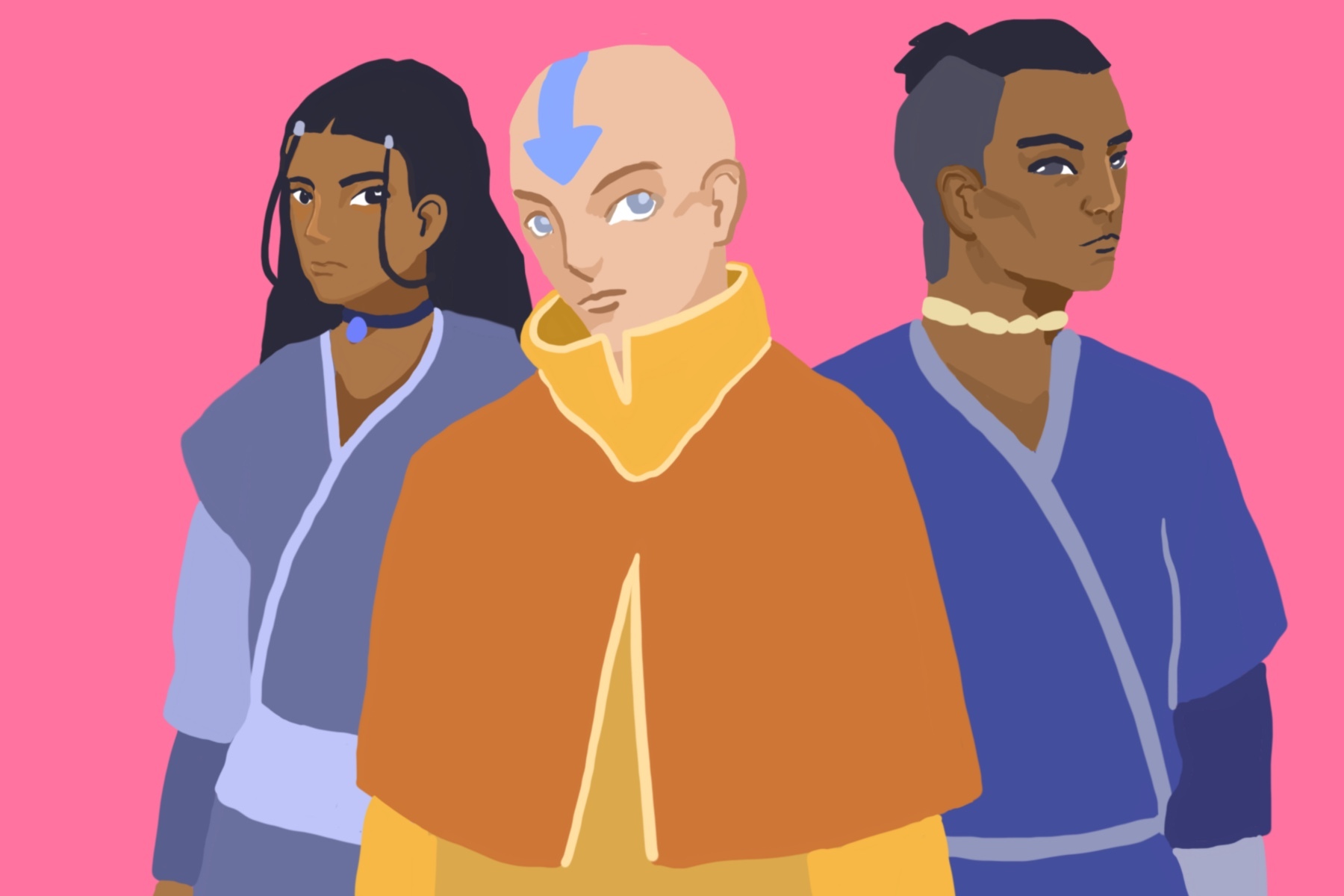Nickelodeon struck gold when it created the critically acclaimed animated series “Avatar: The Last Airbender.” Many people nowadays cannot hear the words “water,” “fire,” “earth” and “air” without thinking about the show and pretending they could, for example, waterbend.
Airing for three seasons, between 2005 and 2008, “Avatar: The Last Airbender” was created by veteran animation directors Michael Dante DiMartino and Bryan Konietzko.
The show centers around an Asian-inspired world, where there are tribes — also called Nations — that can each “bend,” or control, one of four elements: water, fire, earth and air. Outside of those tribes, however, lives an individual called the “Avatar,” who can bend all four elements.
“Avatar” — not to be confused with James Cameron’s “Avatar” with the blue people — focuses on Aang, the last survivor of the Air Nation, named the Air Nomads, and the current Avatar of the series. Joining Aang are his friends Sokka and Katara, who are Waterbenders, and Toph, an Earthbender. Viewers join the group’s adventures as they fight against an ongoing war started by the villainous Fire Nation.
Critics and fans praised the show for its art style, humor and its well-defined characters. And even though it was a children’s show, “Avatar” touched on very important topics and themes, such as war, genocide, imperialism and colonialism, just to name a few.
While it was on the air, the series won a Kids’ Choice Award, a Peabody Award and a Primetime Emmy Award. Many consider the show to be one of the best animated series of all time, and although it is over a decade old, “Avatar” still has a massive following today. With Netflix streaming the popular series as of May of this year, the show is garnering even more fans.
The show’s popularity would later lead to video games, comic books and even a sequel series, “The Legend of Korra.”
Among the spinoffs was — how do I say this nicely? — a horrible film (I tried my best). M. Night Shyamalan, director of films like “The Sixth Sense” and “Unbreakable,” wrote, produced and directed 2010’s “The Last Airbender.” The film did not faithfully follow the source material, and along with its visual effects, writing, casting, acting and many other flaws, it was universally considered one of the worst movies of all time.
One of the main issues people had with Shyamalan’s film was its casting. The original animated series focused on characters from Asian and Inuit cultures. Shyamalan, however, strayed away from this aspect of the show, casting mainly white actors.
The director tried to justify the casting, saying, “Anime is based on ambiguous facial features. It’s meant to be interpretive. It’s meant to be inclusive of all races, and you can see yourself in all these characters. …. This is a multicultural movie and I’m going to make it even more multicultural in my approach to its casting.”
Many fans loved the Asian and Native representation displayed in the original series, so for Shyamalan to essentially erase all of the characters’ races was almost a slap in the face for those who enjoyed the animated show.
Shyamalan planned on making a trilogy of these films, but, for obvious reasons, “The Last Airbender” was the only one produced. The plans for the trilogy were scrapped in favor of yet another live-action rendition, now produced by Netflix and without any involvement from Shyamalan.
The streaming service announced in 2018 that it would start producing a reimagined version of the animated series starting in 2019, with DiMartino and Konietzko returning as executive producers and showrunners. The duo assured fans that they would not whitewash the characters this time around, while also being culturally appropriate. It is also worth noting that the two did not have any involvement in Shyamalan’s version of “Avatar.”
Fans were excited because, who better to create the right live-action series of “Avatar” than its original creators? This was finally the chance for them to be faithful to the original series and correct the wrong decisions made by Shyamalan.
Unfortunately, in August, DiMartino announced that he and Konietzko would be departing from their duties on the show after two years of working on its development. He went on to say that the end product that will be streamed on Netflix will not be in accordance with the vision the two had in mind.
While DiMartino did not exactly explain their reason for leaving, it is assumed by many that it was due to creative differences with Netflix.
Fans panicked, immediately speculating that the show would be dead on arrival before it even comes out.
Many inferred that the conflict between Netflix and DiMartino and Konietzko might have to do with casting issues. While the creators of “Avatar” promised that they would cast people of color that correlated to the show’s characters, many inferred that, due to their departure, Netflix would be more inclined to whitewash the characters yet again — a problem that plagued Shyamalan’s film adaptation.
Some people on Twitter even made light of the situation, joking that Netflix would cast popular white actors, such as Scarlett Johansson, who has already been criticized in the past for portraying POC.
Others became worried that Netflix might be predisposed to age up the characters and add too many unnecessary romances between characters. While there was indeed some romance in the series, it was not an important aspect of the story. Turning “Avatar,” a show with meaningful themes, into a teen drama would be the antithesis of what the show stands for.
Netflix has an example, in Shyamalan’s version, of what not to do when they decide to move on with the show’s production. Rather than ignoring many of the show’s motifs like the film did, perhaps Netflix could do the series justice by addressing them; after all, many of them are still relevant in today’s society.
The streaming service recently responded to DiMartino’s and Konietzko’s departure, stating, “We have complete respect and admiration for Michael and Bryan and the story that they created in the Avatar animated series. Although they have chosen to depart the live-action project, we are confident in the creative team and their adaptation.”
Hopefully, this is true. “Avatar: The Last Airbender” was a game-changing series, and for its live-action remake not to be truthful to the original would be a huge disappointment to fans of the show. Fans have the right to be upset at the creators’ exit, but there is still a chance the show will do just fine.
As long as Netflix does not follow the same direction as Shyamalan did in his film, their rendition may not be as bad as people fear it will be. It is still early, since there is no news about casting or story, but the best fans can do right now is hope for the best so they can see Aang, Katara, Sokka, Toph and all of the other characters done right.
















